If you are thinking about applying for a job position in a production company, there are various legal protection options for your safety. Among these options, signing a deal memo is one of the traditional ways to secure certain rights, such as your right to earn payment for the services you provide.
This memo is a legal document that serves as a contract between you and your employer.
A legal contract binds both employer and employee to specific standard parameters, such as the terms of employment, working conditions, overtime pay, day rate, etc. Since employees are required to put a signature on such a contract, many of them are concerned about the terms they sign up for. In other words, they want to know if it is enough to guarantee a fair deal.
With that in mind, we have come up with a comprehensive guide that will cover the following things:
- The definition and everything it implies
- The differences between a contract and a crew deal memo
- What it should include
- How to get the best template
- What you should know before you sign it
Before signing a memo, read on to learn everything you need to know.
What is a Crew Deal Memo?
The term deal memo refers to a document that determines the terms of engagement between companies and employees.
Although it’s not the same as the employment contract, it is a document you sign before getting an entire contract.
Since drafting an entire contract requires the presence of employment lawyers, the hiring party wants to make sure that the candidates understand the heads of terms, the things they are entitled to, and all other critical points of such a legally-binding agreement.
When it comes to signing a crew memo, the document outlines the conditions and terms every crew member can expect when hired by a production company. In addition, this legal agreement provides both production companies and crew members with clear legal protection options.
The production company has a range of employment obligations, such as gas reimbursement, meal schedule, the duration of employment, expected availability, and compensation terms. Since there are various details to consider, a crew memo touches upon many facets of this type of engagement.
However, the difference between an ordinary corporate memo and a crew memo is that the latter also addresses the requirements that a crew member might be asked to do even after the official working hours. These requirements can be anything from doing additional chores to retaining confidentiality about the project.
Who Provides It?
The production company that hires the crew members issues it for each member. However, there must be an authorized representative present when signing a deal. A representative is commonly the unit production manager or producer.
There are situations where the involved parties don’t agree on the terms of the agreement. In such cases, the parties can reference the terms. Since issues can arise when you least expect them, you should always store its copy.
Crew Deal Memo Vs. Contract
As a production company prepares for a project, they typically start looking for crew members to hire. That’s when each crew member receives a crew memo that addresses the duties they are expected to perform and how the production company plans to compensate them for the provided services.
The first notable difference between a contract and a crew deal memo is that the memo doesn’t have to be legally binding necessarily. But on the other hand, a contract is an official legal document. It is typically a precursor to official contracts.
Each crew member should ascertain whether the memo is legally binding. Suppose there is no statement on the legal standing of a memo. In that case, it is nothing more than a forerunner to the actual contract that allows both parties involved to review the terms before putting their signatures.
Templates
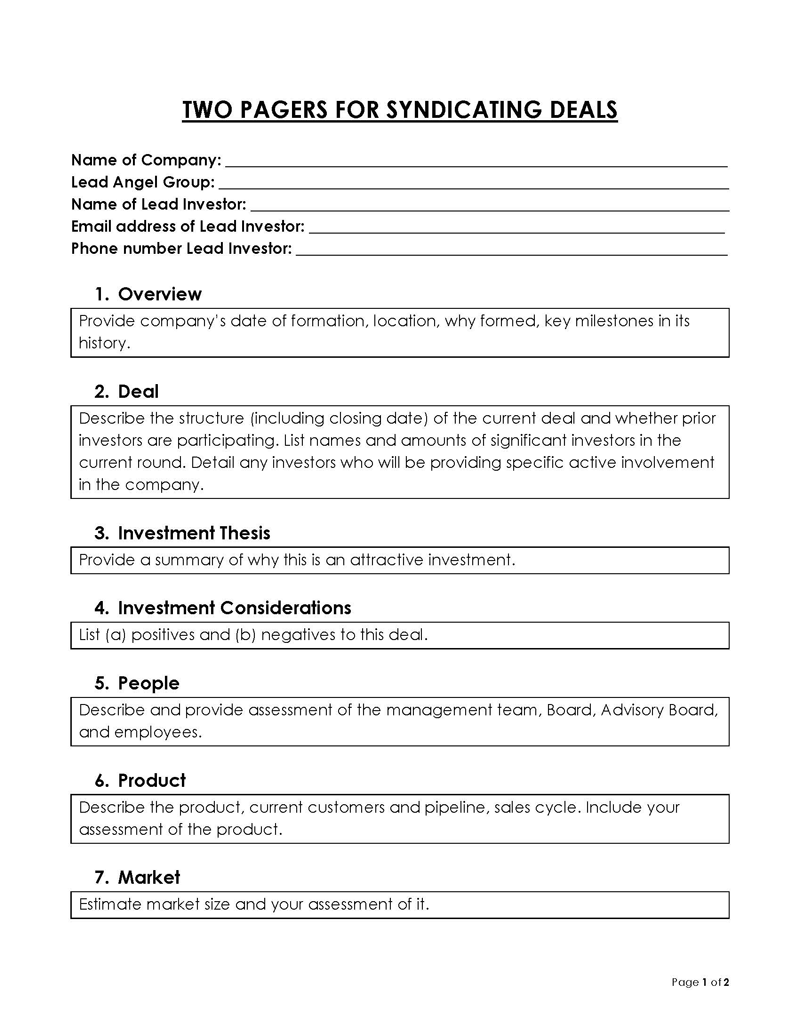
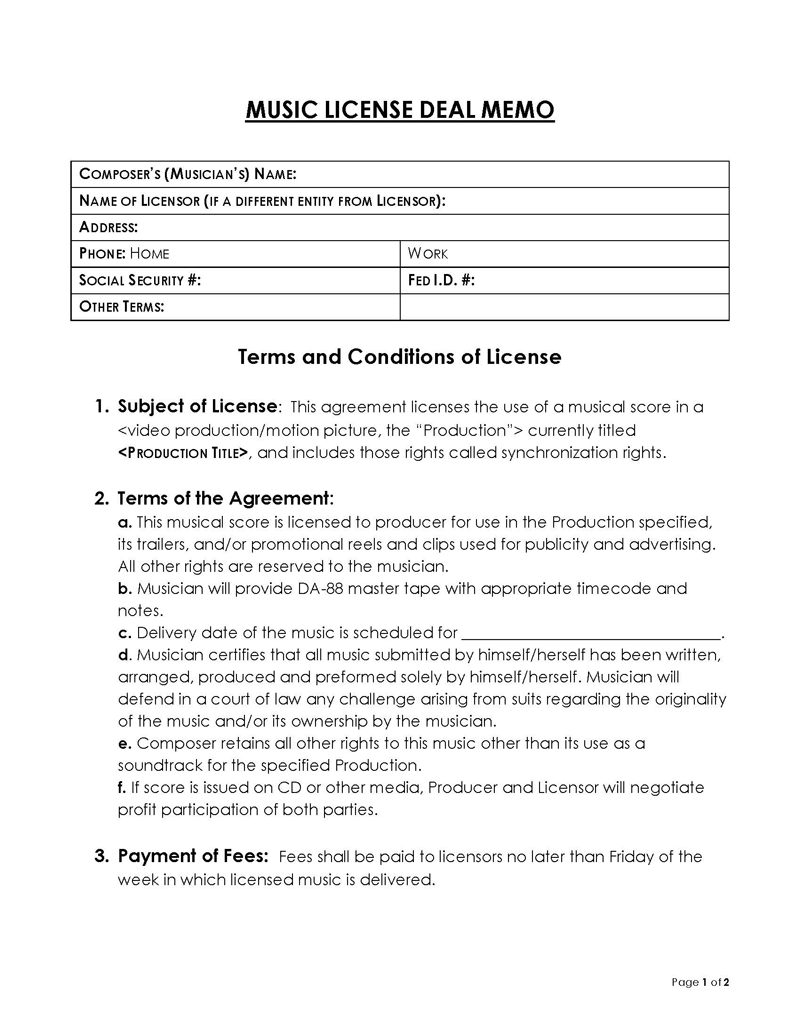
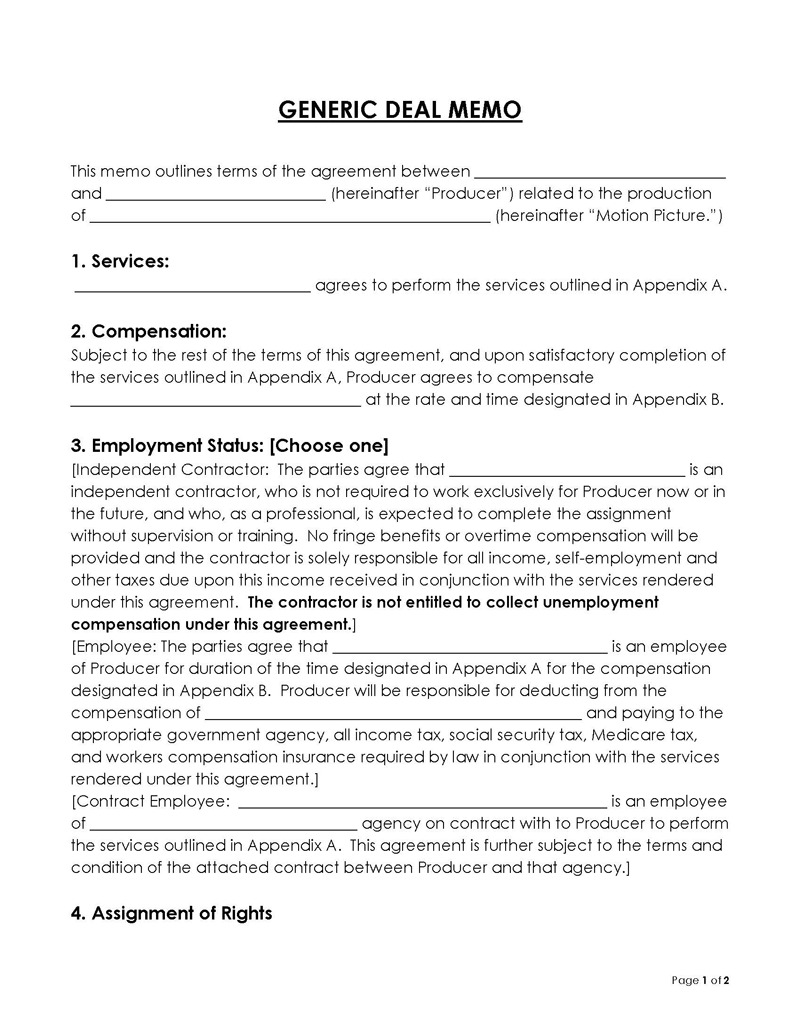
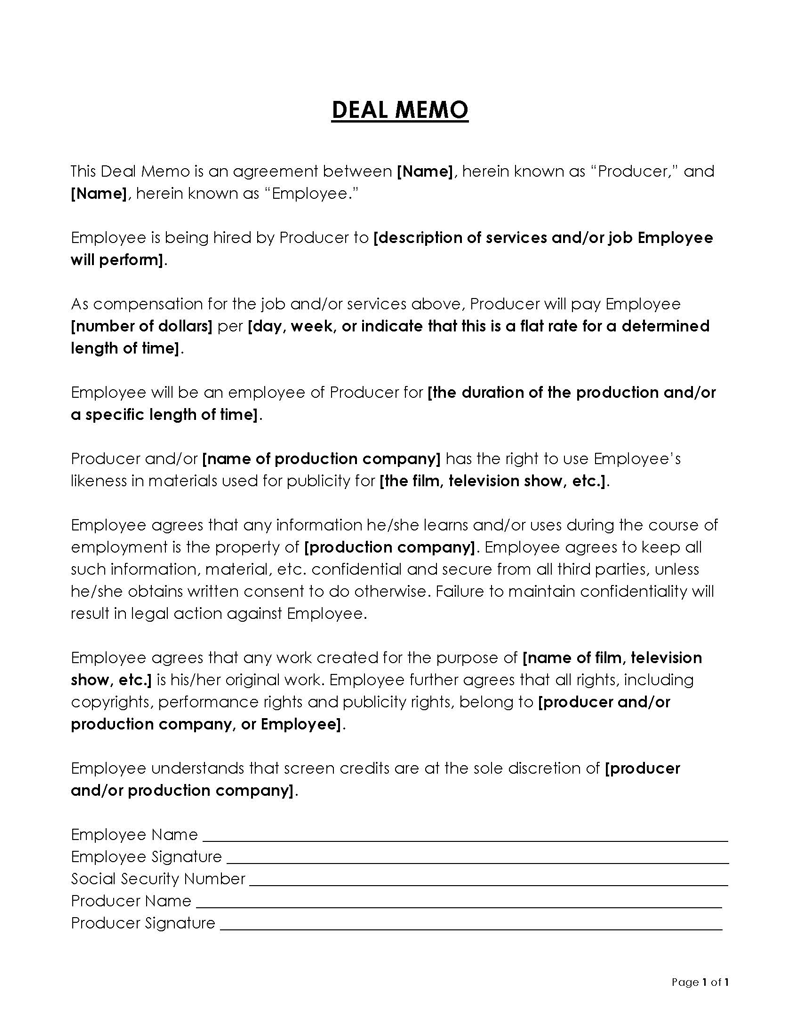
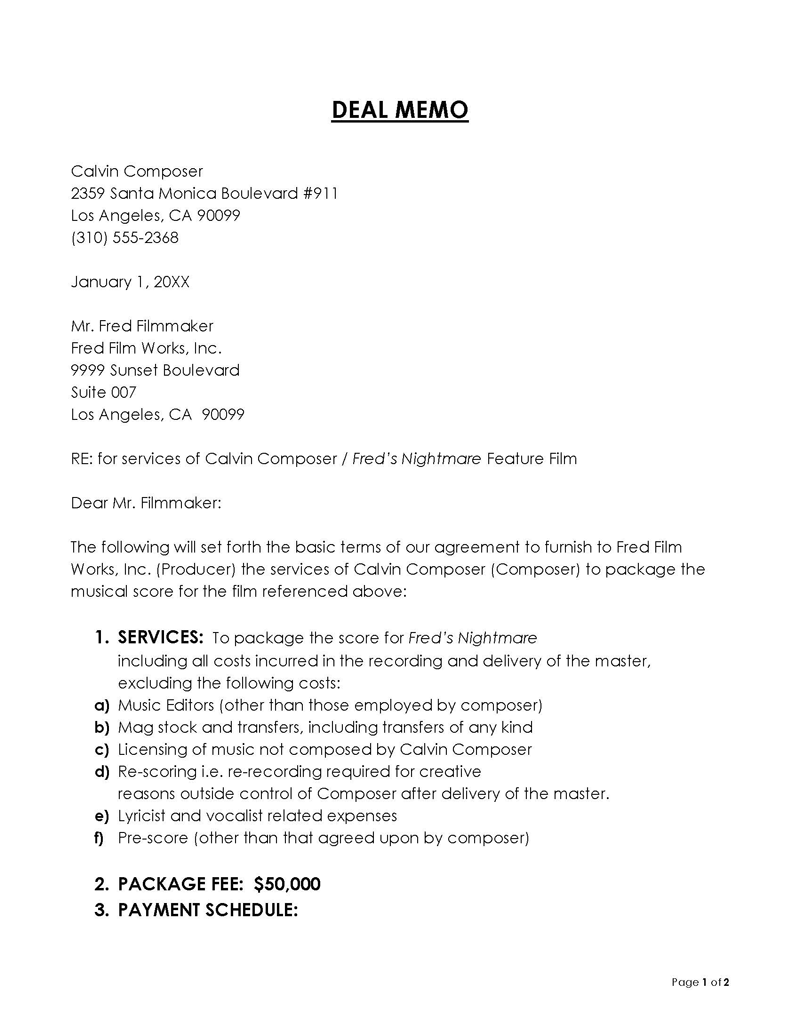
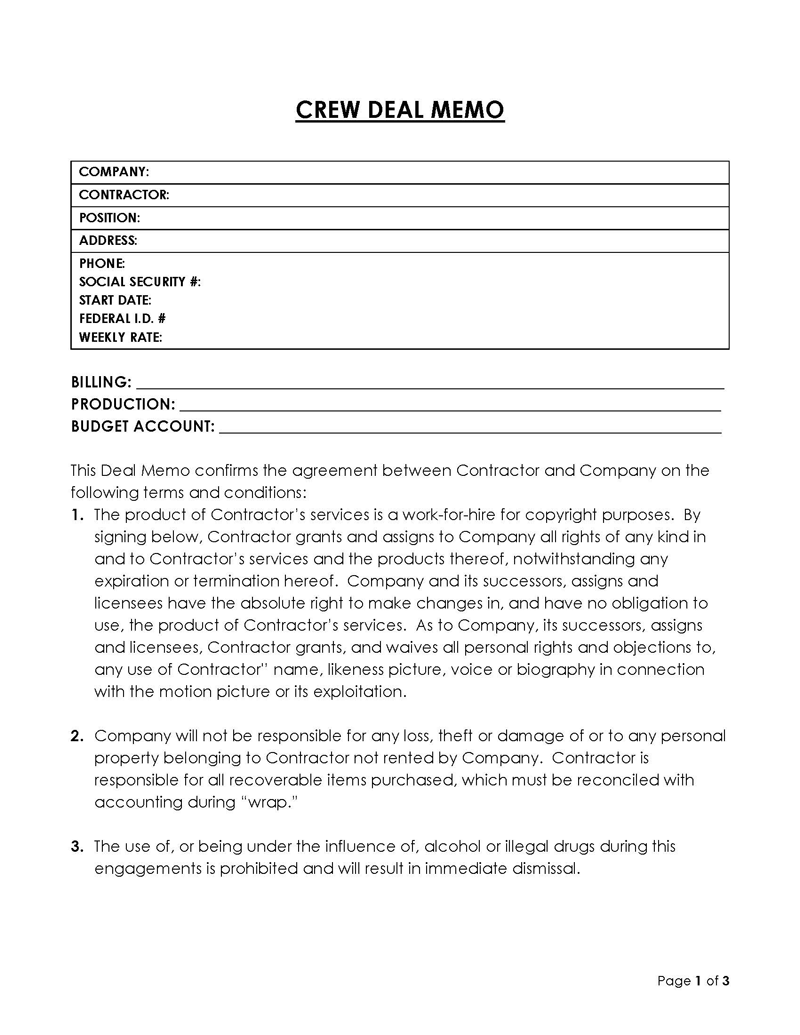
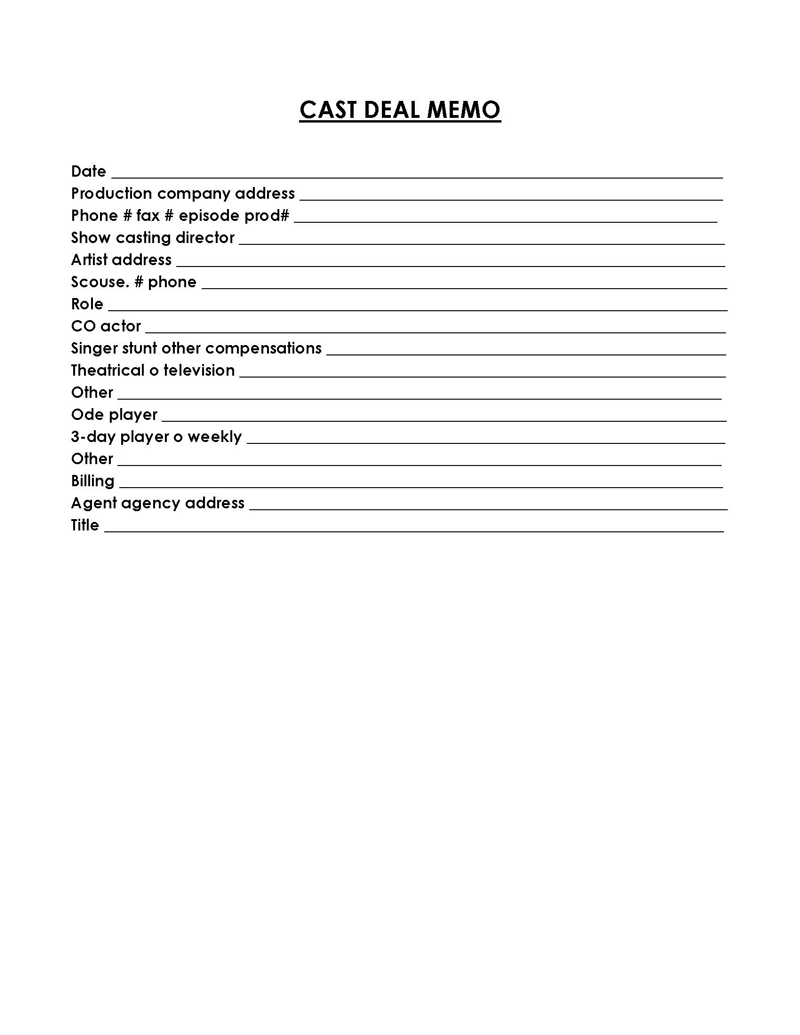
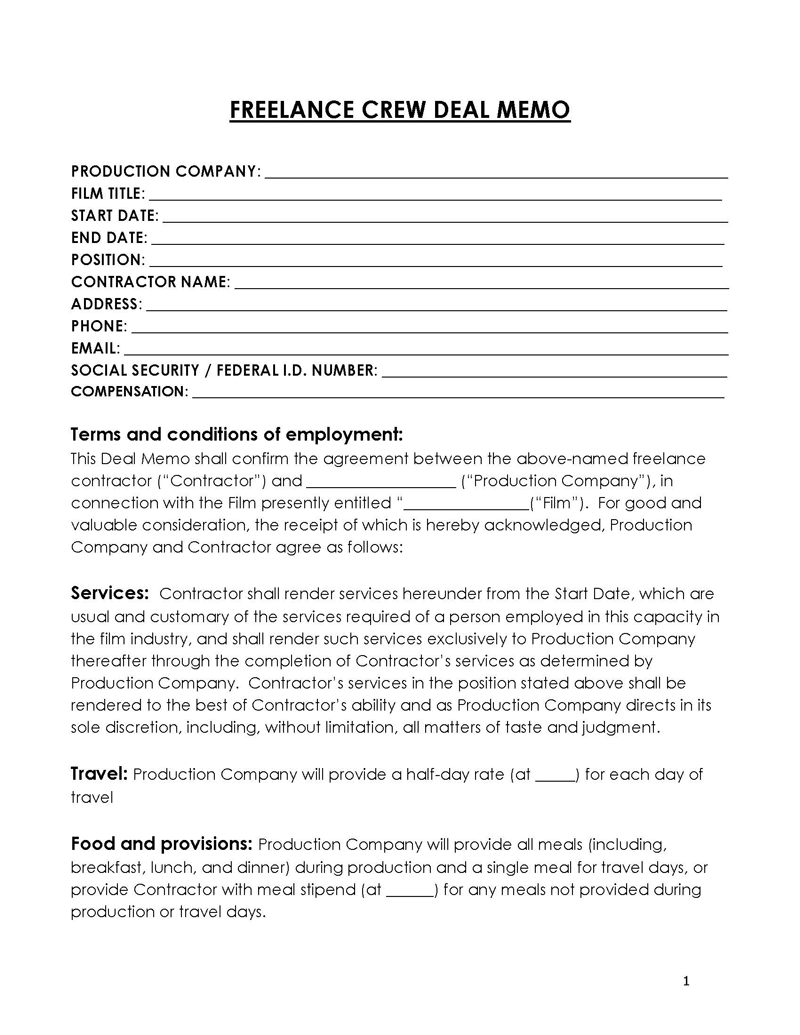

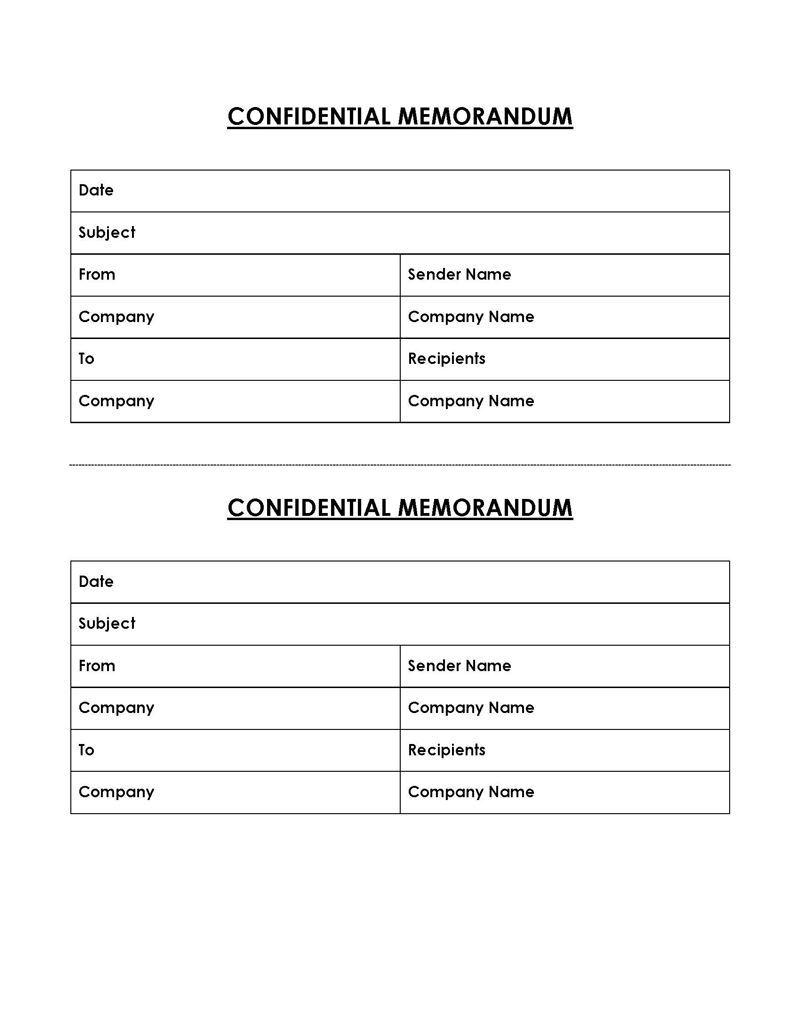

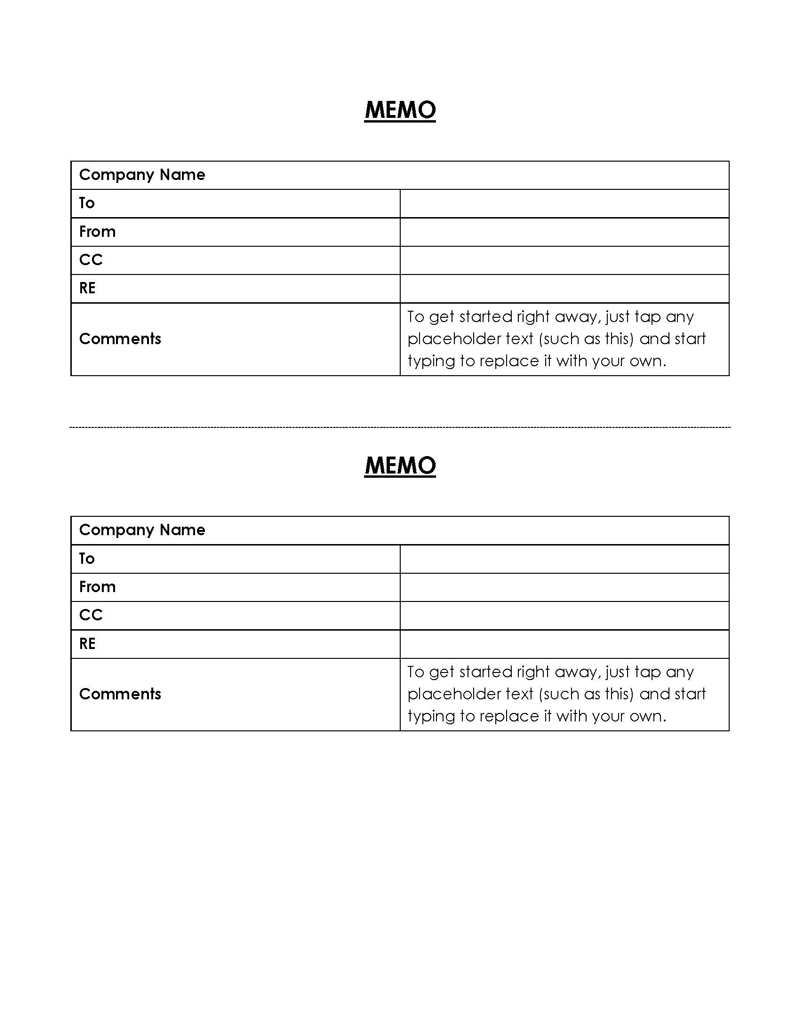
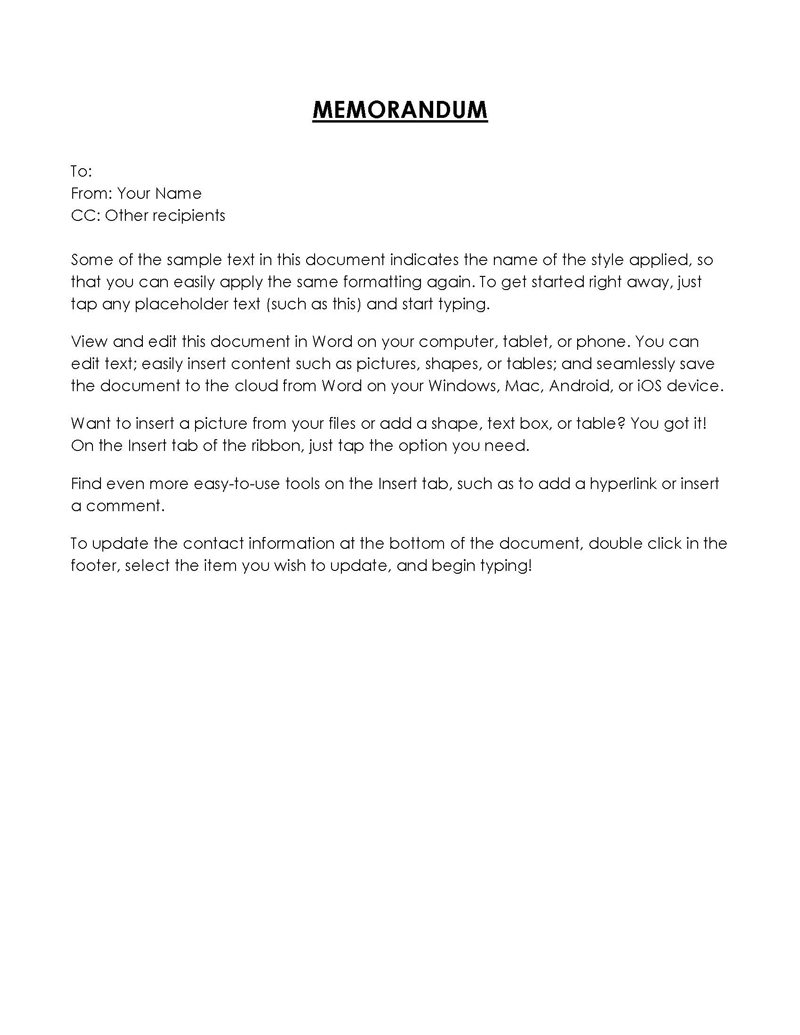
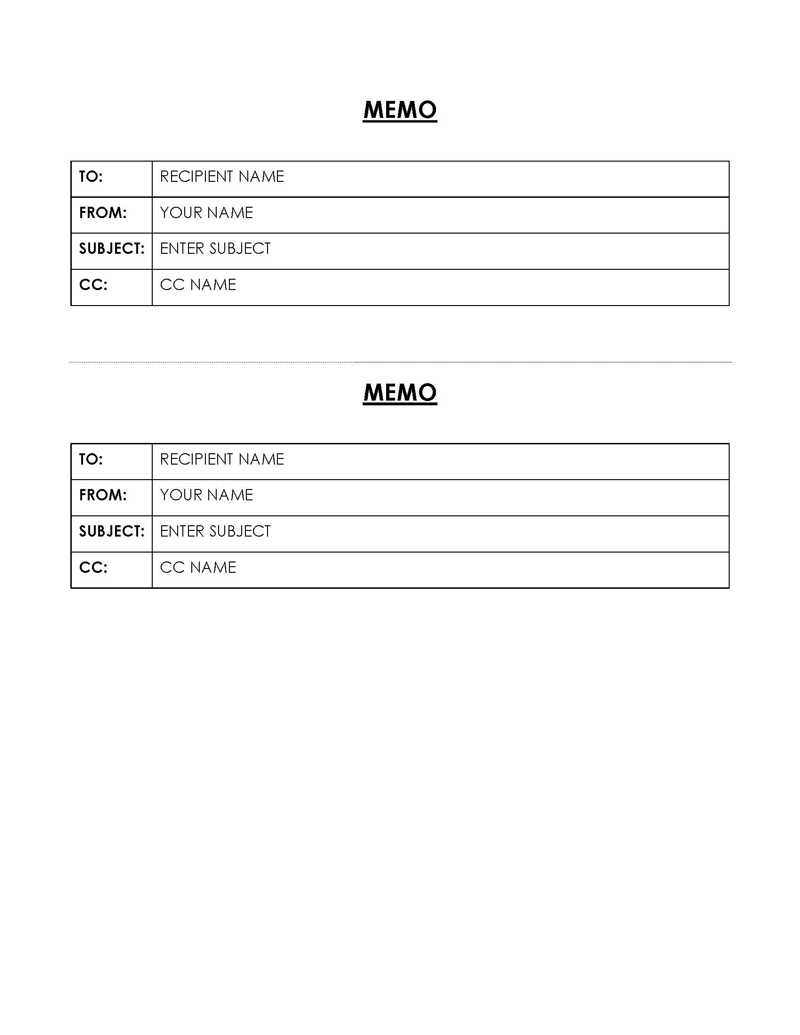
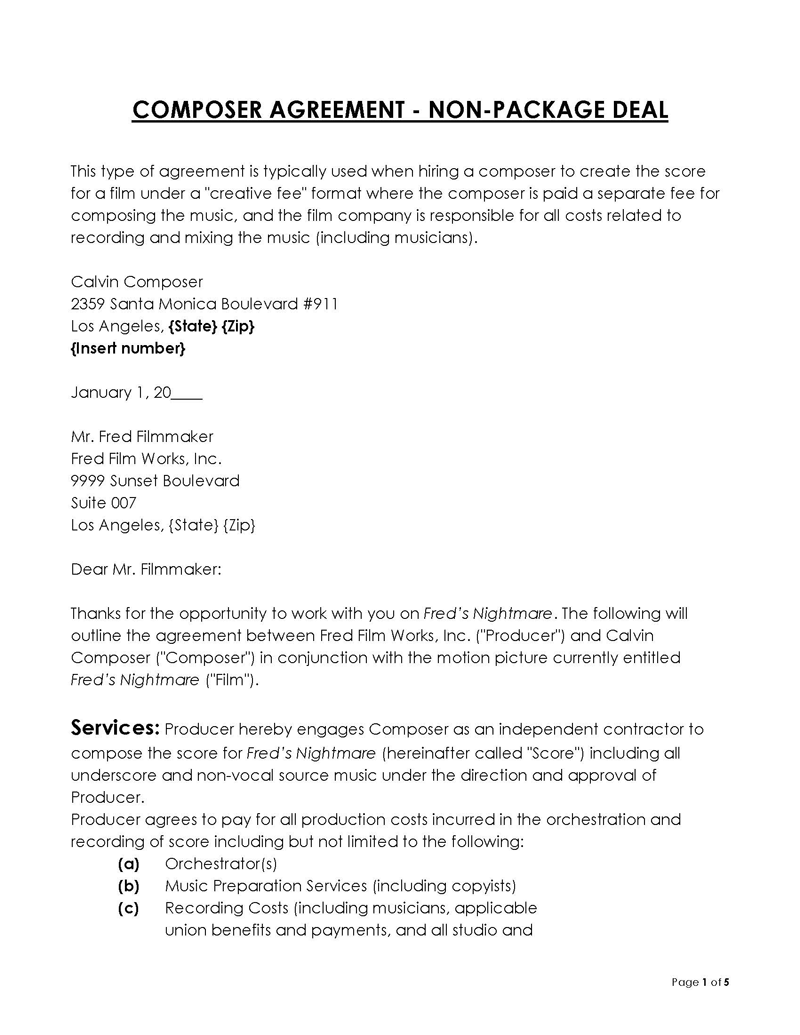
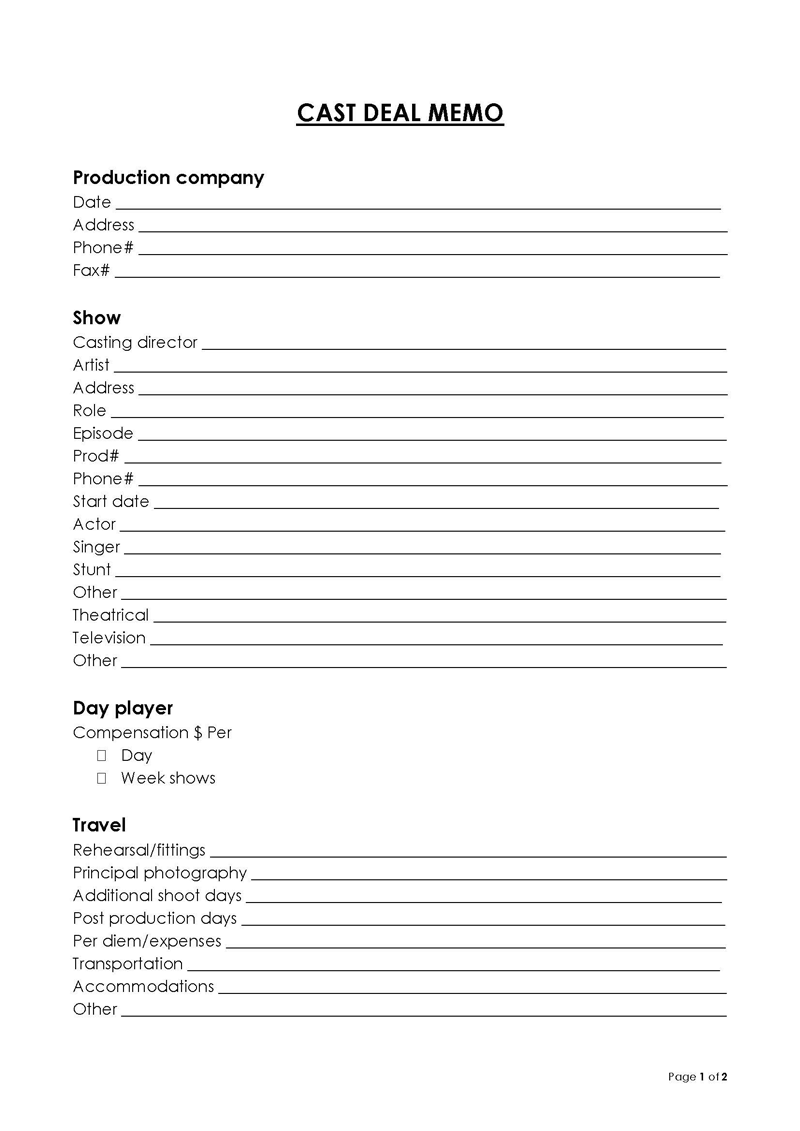
What to Include?
Since a crew deal memo is proof of employment, it should contain all the relevant and essential information that serves as your legal protection if needed.
Here is a list of the requirements that each one should include:
General information
It should include all pertinent general information, such as:
- The name of the production company hiring you
- The project title
- The duration (start and end date) of employment
- Crew member name and position title
- All crew members’ relevant information, including social security number, email address, phone number, and address
Compensation
The compensation section should contain the relevant information on how crew members will receive their compensation and the payment rate. For example, crew members usually receive payment via day rate with any overtime provisions included in the production business.
However, the production company reserves the right to apply any payment method. Therefore, the compensation section should provide details on the form of payment a crew member can expect, be it a day rate, a gross fee, or a weekly or monthly rate.
Terms and conditions of employment
The “terms and conditions” section should clearly state the production company’s name hiring you. If there’s no contractor’s name, the section should contain the name of their loan-out organization and the names of all other parties involved, including the producers, filmmakers, etc.
Services
The section regarding service requirements should clearly outline both general and specific services that the employer expects from a crew member.
Travel and rentals
If working on a project requires you to travel and rent places to stay, this memo should clearly explain the travel and rental day rates. For example, some production companies accept to pay only a half-day rate if travel goes under six hours.
According to SAG, any trip that takes more than an hour requires payment. However, flying on any other day that requires a long journey comes with an additional fee (a total day rate) and an additional travel rate (usually $60) per travel day.
If renting from an outside business is involved, the memo should clearly state your responsibilities regarding the rentals you receive during the project.
Food and provisions
It should specify the exact travel day meal provisions. Each crew member has the right to have three meals per day. If the production can’t provide three meals a day, there must be a compensation per meal missed (around $15–30).
Moreover, a memo should also provide details on which meals the crew members can expect to receive. If the project requires a frequent change of location, the crew has the right to a per diem for missed meals.
Payment schedule
The payment schedule section explains how crew members receive their payment. For example, they can receive payment on an exact date or specify half upfront and half upon delivery.
This also helps the production companies organize their expenses and avoid awkward situations, such as an overdraft on security deposits.
Immigration reform
According to the 1986 Immigration Reform and Control Act, it’s against the law for business organizations of any sort to employ illegal immigrants. Both employees and contractors must present valid proof of US citizenship.
Car insurance
If a crew member works on an independent production set where their vehicle serves as a means of transportation to and from the set, that member has the right to specify how they want to receive the compensation.
Mileage and purchases
The production company should provide gas reimbursement if a crew member travels more than an hour to the shooting set. However, they will require a receipt to provide full reimbursement. It determines how you’re going to receive reimbursement.
There is a standard rate for businesses that you can receive in a few different ways:
- As an added amount to your paychecks
- In cash
- As a daily/weekly/monthly rate
Production company equipment
Most production companies have a project coordinator or production assistant who keeps track of the production equipment. However, there are situations where the crew is responsible for the equipment.
Since the last thing you need is to pay for additional expenses, the memo should address your responsibility if the equipment gets lost, stolen, or damaged due to gross negligence.
Screen credit
It should let a crew member know their published contribution. Each crew member receives a card and has the right to screen credits. Because of that, the screen credit section should explain in detail whether you get your card and its placement among the credits given to other members.
No waiver
The “no waiver” section seals the contract terms and prevents the production company from making any alterations to the existing terms. The contractor can only revise or amend the terms if both parties agree.
Work for hire
A memo template should define the payment to which a crew member is entitled. The contractor can’t alter the terms of payment, nor do they have the right to own a percentage of payment defined in the memo.
Availability
Every memo should include a section on the compensation in the case of overtime. It should define the times and days that the crew member may be expected to work. In the event of overtime, the director or producer reserves the right to keep everyone working until they tell them otherwise.
Termination
The termination clause is probably one of the most critical sections. It defines the terms of termination of a crew member from a project. Therefore, it’s best to add it to the template as a standalone section.
Publicity
Certain production companies insist on using their crew members’ pictures, and voices for promotional purposes. While most crew members won’t have a problem with this, we recommend that you define how, when, and where your details will appear in the agreement template. If you don’t want to see your details on news stories, media, books, trailers, trades, and blogs, make sure you say so.
Arbitration clause
The arbitration clause is your legal protection that ensures you receive legal intervention if a dispute with the production company occurs. Nobody likes lawsuits, it is crucial to agree, and the arbitration clause outlines how to proceed legally on the matter.
Entire agreement
We recommend hiring professional legal help to review your deal and ensure you haven’t left out any of the most important provisions. Hiring a lawyer also provides you with all the necessary legal protection if any disputes arise.
No obligation to produce
The production company that hires the crew members reserves the right not to include your contribution in the finished project. The ‘no obligation to produce” section defines the company’s decision whether or not to use your contribution in the project’s completion.
Assignment
The assignment provision allows the crew member to remain hired if another contractor resumes the project. On the other hand, the production company relies on this section to assign projects with all the terms of the agreement to another contractor.
Hold harmless
Just like crew members require legal protections, the same goes for the production companies. If there’s an additional expense, cost, liability, claim, or loss of means or equipment, the production company relies on the “hold harmless” section to protect itself from any damages or losses incurred during the project.
Things to Know Before Signing the Deal
Here are the essential questions before you put your signature:
The only thing as necessary as your standard rate is the overtime pay. However, since smaller production companies will try to avoid paying overtime, it would be wise to clear this point up before you sign it.
Projects often break deadlines, and it’s good to understand your options in such situations to know what to expect. The last thing you need is extra work you didn’t know about. Make sure to ask about your responsibilities if needed.
Since the production company is responsible for providing three meals a day for each crew member, make sure you ask about receiving compensation for any missed meals. A per diem is the term that refers to a small amount of money that crew members receive instead of meals.
Projects go to waste from time to time, but that doesn’t mean the crew should work for free. If the project fails, you should know your rights regarding receiving proper compensation in the form of a kill fee.
Getting reel footage without the contractor’s knowledge or consent could expose you to additional legal complications. If you need the footage for your reel, the best way to obtain it and avoid any awkward situations is to add it to your memo.
Even though prep/wrap-out days don’t require the intensive work that the actual production days do, they still require your time and effort. In other words, you should receive proper compensation for your time. Most production companies agree to pay a half-day rate for this, but it all comes down to what is both fair and reasonable.
Conclusion
The more sections you cover with your memo, the better the conditions you get for your time and effort. Each clause is crucial to getting the best terms of employment and ensuring you receive the payment you deserve.
The best option is to download a free, pre-built template to ensure that all the essential clauses are included in your agreement. Whether you’re a production company or a crew member, these templates provide all the assistance, questions, and sections to protect you from disputes and legal problems.




